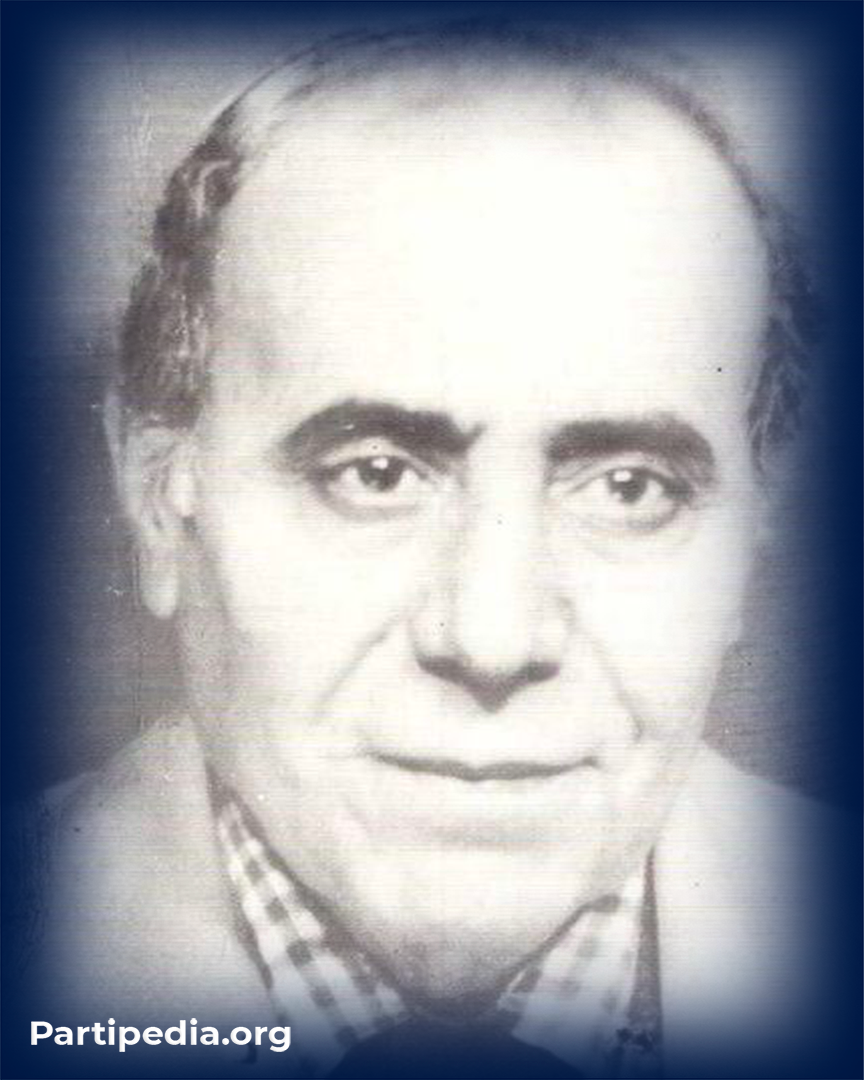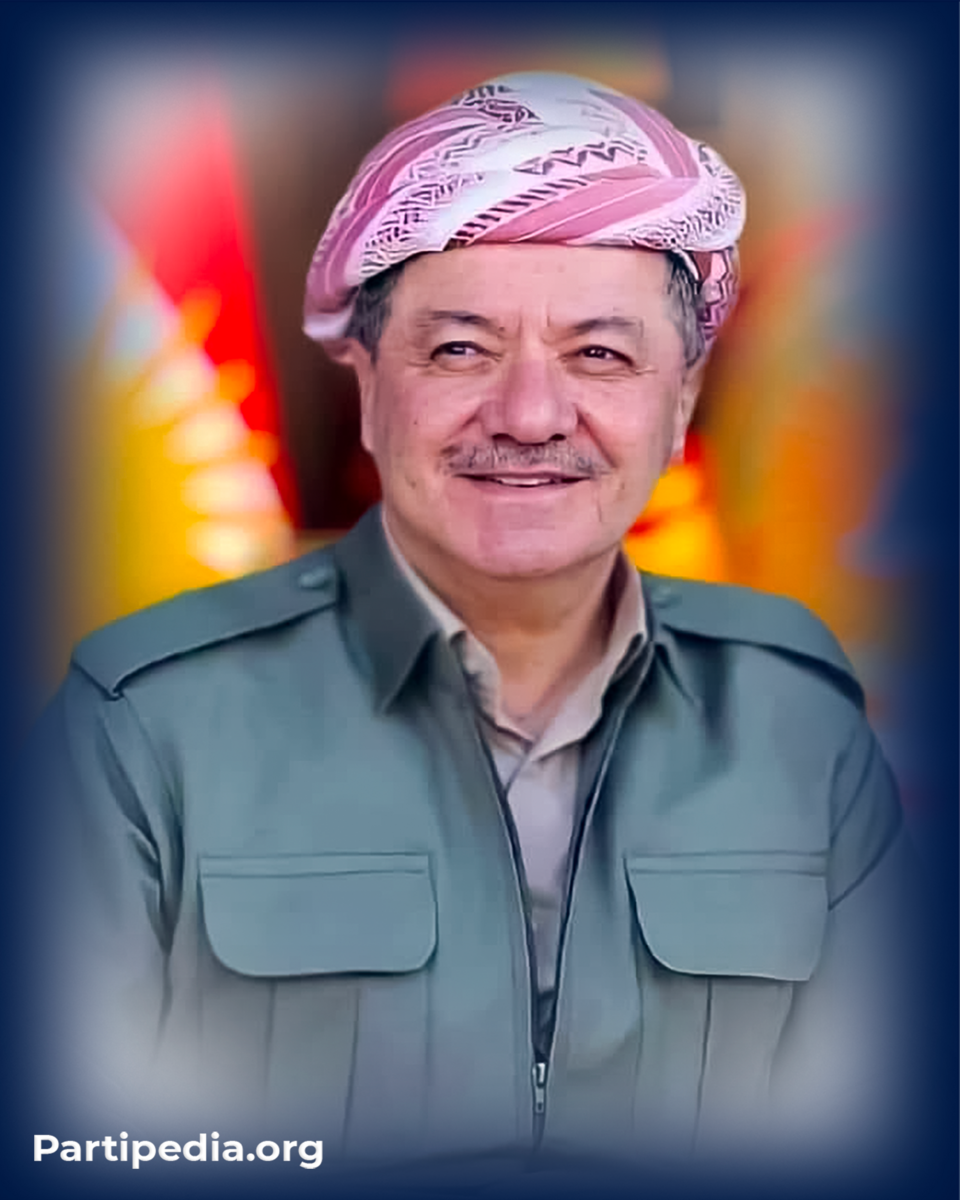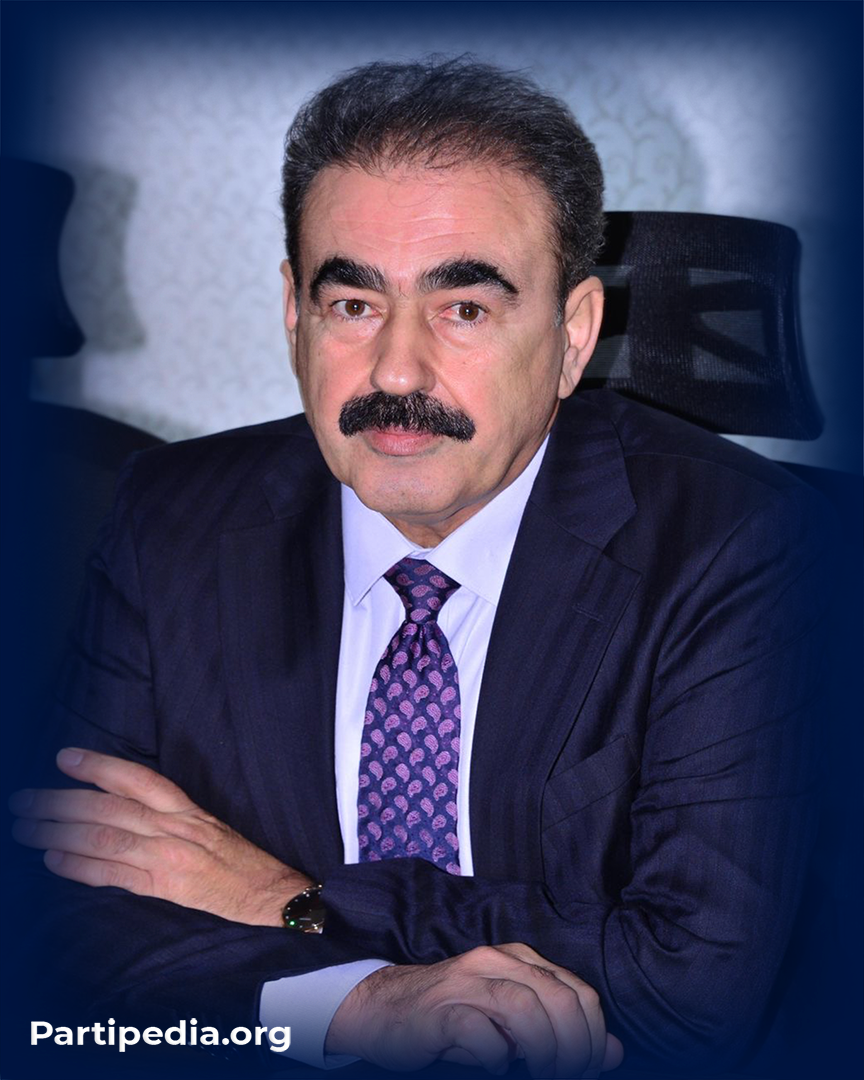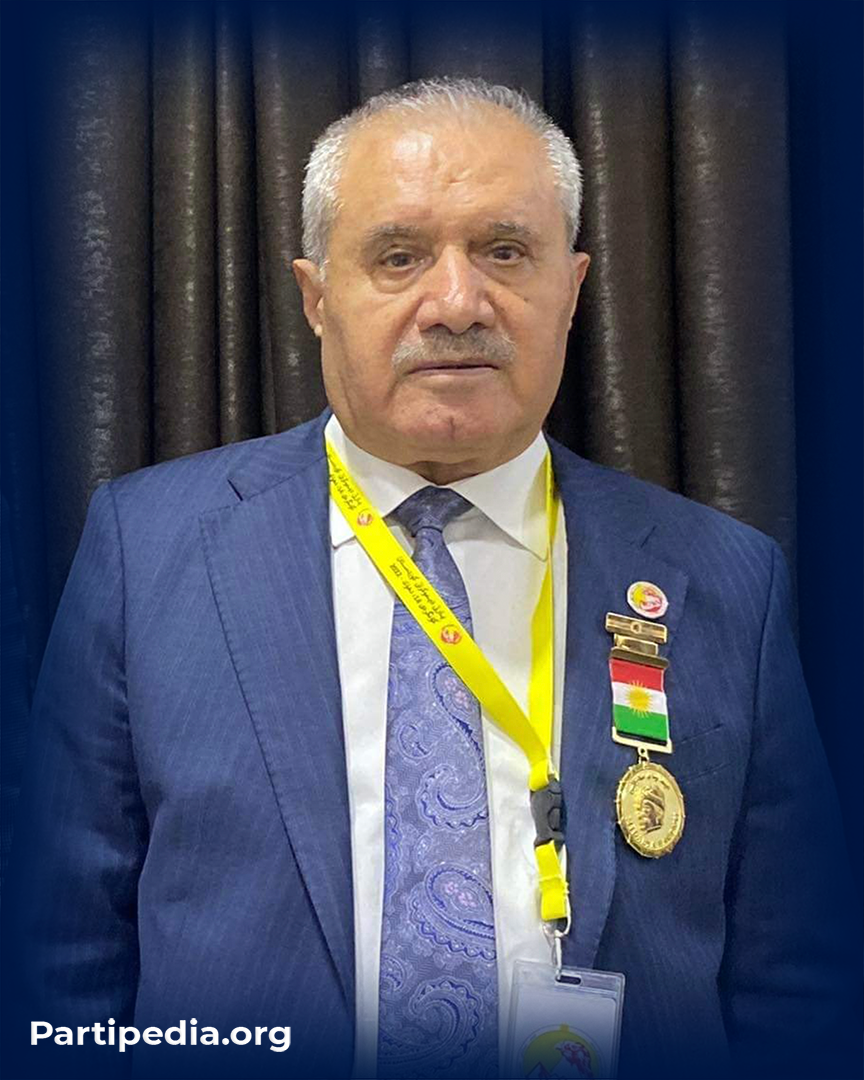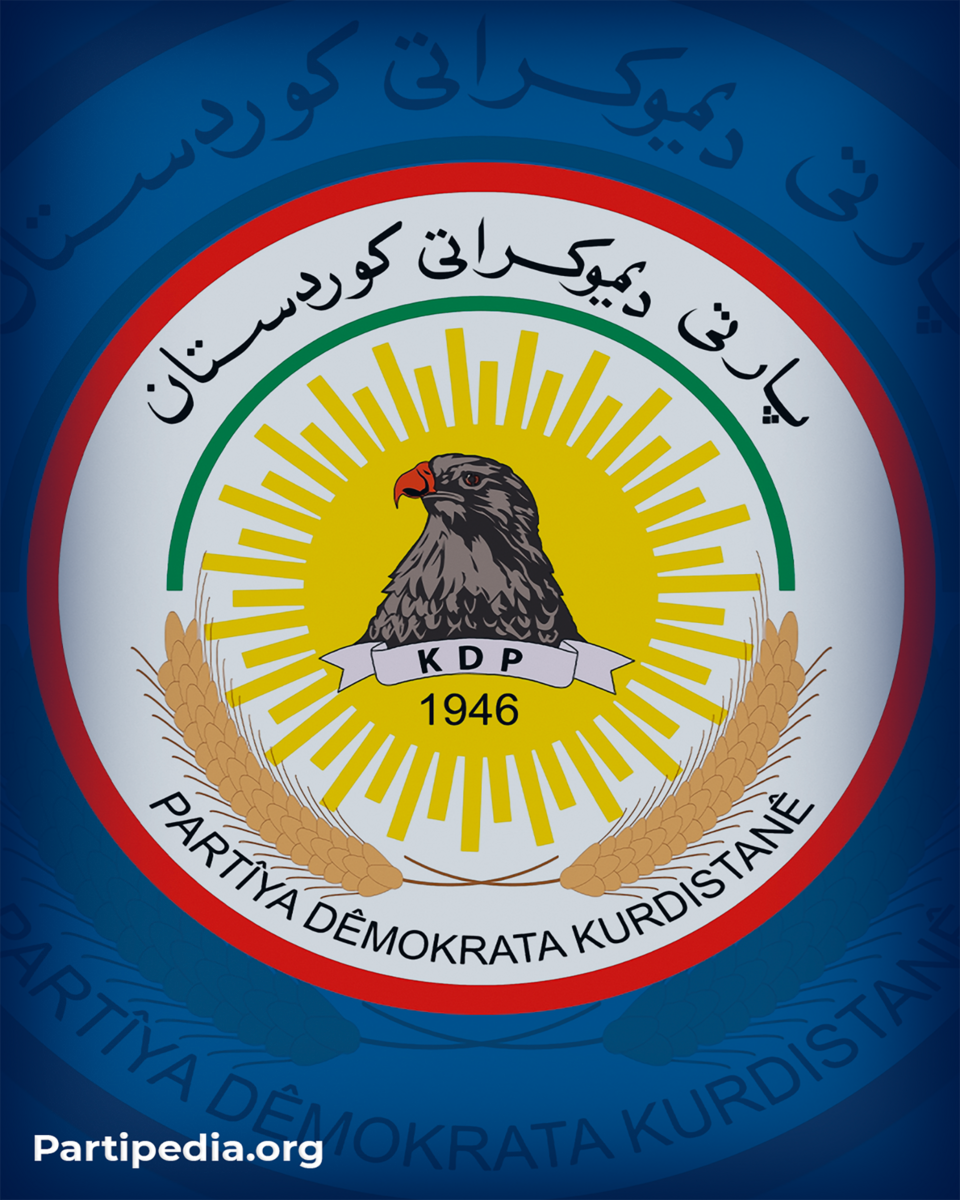Biography
Nouri Sadiq Ali Rasul, also known as Engineer Nouri Shaweis, was born in 1922 in Suleimani (1922-1983). He was the son of Sadiq Shaweis, an officer during the reign of Sheikh Mahmoud Hafed (1881-1956). He participated in the Battle of Derbandi Bazian against the British royal army.
He was married to Nahidah Salam Ahmad (1922-2005), also known as Mrs. Nahidah Salam, a member of the Kurdistan Democratic Party (KDP) Central Committee.
The grandfather of Dr Roj Nouri Shaweis was a member of the Political Bureau of the Kurdistan Democratic Party (KDP). Bruska Nouri Shaweis was a member of the Central Committee of the Kurdistan Democratic Party (KDP).
He graduated from the College of Engineering in Baghdad in 1945. In 1946 he was transferred to Hila as an engineer. In 1948 he was expelled to Hila by the authorities of the Kingdom of Iraq. In 1962 he was appointed Deputy Director of Labor and Housing in Baghdad. In 1964, he worked as a teacher in the only school in the revolutionary Centre in Galala. On March 29, 1970, he was appointed Minister of Roads and Housing in the cabinet of Ahmed Hassan Baker (1914-1982).
In 1970, he underwent heart surgery at Cleveland Hospital in the United States. In 1972, he attended the funeral of Sheikh Latif Hafidi in Suleimani with Ali Abdullah on behalf of President Mustafa Barzani. On Sunday, July 2, 1972, he was admitted to the Soviet Union for treatment as he was summoned to Moscow for a month.
In September 1972, he was a member of the founding committee of the Salahuddin Family Club in Baghdad. On August 12, 1973, he was appointed minister of state by a republican decree.
In early 1974, he was the Secretary General of the Secretariat of Housing and Municipalities of the September Revolution. In 1974, he was appointed Minister of Transportation and Roads after the passing of the law of the Legislative and Executive Councils of the Kurdistan Region. On April 7, 1974, he was removed as minister of state in the cabinet of Ahmed Hassan Bakr by a republican decree. On April 28, 1974, his family was deported to the liberated areas after the Iraqi government seized his house.
He fled to Iran in 1975 after the collapse of the September Revolution. In November 1976, he applied for political asylum in the United Kingdom. He was granted political asylum in the UK on May 14. He died on November 15, 1983, in the United Kingdom. He was proficient in Kurdish, Arabic and English.
The struggle
Engineer Nouri Shaweis joined the ranks of the Kurdish Freedom Association in 1935. In 1936, he participated in the funeral demonstration of General Mustafa Pasha Yamulki (1866-1936) in Suleimani.
On March 20, 1937, he was arrested by the police for igniting the Newroz fire in Mama Yara Hill in Suleimani. In 1937, he was involved in publishing the statement of the Kurdish Freedom Association against the Saadabad Agreement. In 1937, he was involved in collecting signatures for the removal of the anti-Kurdish governor, police director and judge of Suleimani. In 1937 he was involved in a political movement with the Kurdish Brotherhood in Suleimani. In 1937, he was one of the founders of the Darker Association in Kirkuk. In 1939, he was one of the founders of the Kurdish Hope Party(هیوای كورد) in Kirkuk. In 1939, he was elected vice president of the Kurdish Hope Party at its first Congress. In 1940, he was a trusted representative of the leader of the Kurdish Hope Party in Suleimani. In 1942 he was active in the Scientific Society in Suleimani.
In 1942, he intended to work for the Kurdish Radio in the Middle East, which had been established by the united kingdom authorities in Jaffa, today's Israel, to broadcast news and propaganda about the war. Nevertheless, the authorities of the Iraq kingdom did not approve of his travel and work in the radio station, and he could not do so. In 1944, he was one of the founders of the Right Path Society. In 1944, he was one of the founders of The Liberation Society)Komala Rzgari(. In 1945, he became an active cadre of the Communist Party of Iraqi Kurdistan (Revolutionary Party). In the same year, he was a member of the founding committee and leadership of the Kurdish Liberation Party. In 1946, he was an actor in the play "On the Road to the Country", which was staged in Suleimani, and the proceeds were donated to the earthquake victims in Penjwen. In 1947, he participated in the demonstration and burial of the bodies of two martyrs, Mustafa Mustafa (1912-1947), known as Mustafa Khoshnaw and Mohammed Mahmoud Mohammed (1922-1947), known as Mohammed Qudsi. In 1948, he participated in demonstrations against the Portsmouth Agreement. In 1951, he was elected as a member of the Provisional Central Committee of the Kurdish Democratic Party (Second Congress) by Congress representatives. In 1953, he was elected as a member of the leadership of the Kurdistan Democratic Party (KDP) (Third Congress) by Congress representatives. In 1955, he and Jalal Talabani (1933-2017) sent a letter of protest to the British Communist Party on behalf of the Kurdistan Democratic Party (KDP) through the Iraqi Communist Party. In 1959, he was a representative of the first branch committee in the fourth Congress. After the Fourth Congress, he was appointed head of the first branch committee of the Fourth and Fifth Congress. In 1959, he was elected as a member of the Central Committee of the Kurdistan Democratic Party (KDP) (Fourth Congress). In 1959, he was involved in suppressing the coup d'état of Colonel Abdul Wahab Shawaf (1916-1959) in Mosul. On June 28, 1959, he sent a letter of support to Iraqi Prime Minister General Ruken Abdul Karim Qasim on behalf of the Kurdistan Democratic Party (KDP) on behalf of the National Union Front. In 1959, he became a member of the Iraqi Union of Engineers. In 1959, he was the Iraqi Union of Engineers vice president. In April 1959, he delivered a speech to the Kurdistan Democratic Party (KDP) at the return of Barzani's comrades from the Soviet Union in the People's Hall in Baghdad.
On Saturday, December 8, 1960, he was a member of the founding committee of the open struggle phase of the Kurdistan Democratic Party (KDP). In 1960, he was a member of the conference committee of the fifth Congress of the Kurdistan Democratic Party (KDP) in the Garmian region. In 1960, he presided over the conference of the Kurdistan Democratic Party (KDP) in the Garmaser region to elect the representatives of the fifth Congress. In 1960, he was elected as a member of the Central Committee of the Kurdistan Democratic Party (KDP) (5th Congress). In 1960, he submitted his resignation to PKK leader Mustafa Barzani, but his request was rejected. In 1960, he visited Moscow with a delegation of the Iraqi government and spoke with officials about the plight of South Kurdistan. On March 21, 1961, he attended the Newroz celebration in Bonn, Germany. On December 23 1961, he was appointed chairman of the disciplinary committee of the Ministry of Roads and Housing for the Soviet Union. In 1961, he became a member of the Board of Directors of the Iraqi Real Estate Bank. 21-25 August 1961: Participated in the 6th Congress of the Kurdish Students Association in Europe in Munster, West Germany. In 1961, he participated in the last meeting of the Kurdistan Democratic Party (KDP) leadership at the house of Dr Murad Aziz in order to prepare for the revolution. He fled in 1961 before being arrested by Iraqi intelligence forces and hid in Baghdad for a while. In September 1961, he met with Jamal Haider Asim (1926-1963), also known as Jamal Haider, a member of the Political Bureau of the Iraqi Communist Party, in order to help them with the revolution in South Kurdistan. On 18-23 December 1961, he participated in the meeting of the Central Committee of the Kurdistan Democratic Party (KDP) in Awalani village of Suleimani province in order to continue the September Revolution. In 1962 he joined the ranks of the Peshmerga forces. On December 19, 1963, he was a member of the negotiating delegation of the September Revolution with the Iraqi government representative in Ranya, Suleimani province. In 1963, he met David Adamson, a journalist for the British newspaper The Sunday Telegraph. In 1964, he participated in the opening of the 9th Congress of the Kurdish Students Association in Europe in Hanover, Germany, as a representative of the Kurdistan Democratic Party.
In 1964, he encouraged the wing of the Political Bureau to fight against the president's wing. In 1964, he was expelled from the ranks of the Kurdistan Democratic Party (KDP) at the party's sixth congress for supporting the decisions of the Mawat all-around meeting. After joining the Ibrahim Ahmad-Jalal Talabani group on December 28, 1966, he joined the Iraqi government. He turned his back on the September Revolution. On February 21, 1966, he and Ali Abdullah and Nouri Ahmad Taha sent a letter to President Mustafa Barzani expressing their readiness to serve the Kurdistan Democratic Party (KDP) and the September Revolution. In mid-1966, he was appointed by the Central Committee of the Kurdistan Democratic Party (KDP) as a member of the Preparatory Committee for the Seventh Congress. In 1966, with respect to his standings, he was re-elected as a member of the Central Committee of the Kurdistan Democratic Party (KDP) (Seventh Congress). In 1966, he was elected a member of the Political Bureau at the first meeting of the Central Committee. In 1966, he was appointed as a member of the Revolutionary Leadership Council in Iraqi Kurdistan. In 1966, he was appointed as a member of Iraqi Kurdistan's Executive Bureau of the Revolutionary Leadership Council. On April 15 1967, he was appointed as a member of the Political Bureau of the Kurdistan Democratic Party (KDP) under the supervision of President Mustafa Barzani, To represent the Kurdistan Democratic Party in the Military-Political Conference of Kani Smaq (Erbil). From November 1968 to February 1969, he taught the program and internal rules(bylaws) of the Kurdistan Democratic Party (KDP) in the first round of the KDP cadre training school in the Choman district of Erbil province. From April 1969 to August 1969, he taught the Kurdistan Democratic Party (KDP) program in the second round of the KDP cadre training school in Nawprdani village of Erbil province. On December 10, 1970, he was a member of the nine-member delegation of the Kurdistan Democratic Party (KDP) to negotiate autonomy for South Kurdistan with Ba'ath Party officials in Baghdad. On March 11, 1970, he was a member of the Kurdistan Democratic Party (KDP) delegation to the announcement of the March 11 Agreement for the Right of Kurdistan's Autonomy by President Ahmad Hassan Bakr (1914-1982).
In 1970, he was elected as a member of the Central Committee of the Kurdistan Democratic Party (KDP) (Eighth Congress)by Congress representatives. In 1970, he was elected a member of the Political Bureau at the first meeting of the Central Committee. On Friday, June 12, 1970, he was a member of the Kurdistan Democratic Party (KDP) delegation to visit Najaf in western Iraq to attend the funeral of the Great Ayatollah Abdul Mohsen Hakim (1889-1970). World Shiite Marja'i. On Sunday, August 16, 1970, he participated in the 24th anniversary of the establishment of the Kurdistan Democratic Party (KDP) in Baghdad. From July 1970 to November 1970, he taught the program and internal rules(bylaws) of the Kurdistan Democratic Party (KDP) in the third course of the KDP cadre training school in Baghdad. In 1970, he was a member of the Kurdistan Democratic Party (KDP) delegation with the Ba'ath Party to merge the Kurdistan Teachers Union and the Iraqi Teachers Union. This merger failed due to the insistence of the other side on their conditions. In late October 1970, he was a member of the Kurdistan Democratic Party (KDP) delegation to eliminate the interference of the Ba'ath Party in the student elections in Kirkuk province. In 1971, he was a teacher in Baghdad's third round of cadre training school. On Monday, February 1, 1971, he participated in the graduation ceremony of the third round of the Kurdistan Democratic Party (KDP) cadre training school at the headquarters of the fifth branch committee in Baghdad. On Sunday, May 30, 1971, accompanied by Habib Faily, he received a delegation from the Central Committee of the Bulgarian Communist Party in Baghdad. On Tuesday، June 22، 1971، Saleh Abdullah Najmadin (1918-1981), known as Saida Salih Yousefi, welcomed the delegation of the Communist Party of Kurdistan at the headquarters of the Fifth Branch of the Democratic Party of Kurdistan in Baghdad. On August 16، 1971، he participated in the Silver Jubilee Celebration، the 25th anniversary of the founding of the Kurdistan Democratic Party, at the headquarters of the Fifth Branch Committee in Baghdad. On Wednesday, April 12, 1972, he received a delegation of the United Socialist Party of Germany led by Frost at the headquarters of the fifth branch committee in Baghdad. On Sunday, May 28, 1972, he received a delegation of the Lebanese Communist Party led by Nadim Abdul Samad in Baghdad.
On Thursday, June 1, 1972, a delegation from the Kurdistan Democratic Party (KDP) and the Iraqi Communist Party met with Saddam Hussein (1937-2006), also known as Saddam Tikrit, to discuss the domestication of Iraqi oil. On Monday, June 5, 1972, accompanied by a delegation from the leadership of the Kurdistan Democratic Party (KDP), he received a delegation of the Soviet Communist Party led by Malyakhov at the headquarters of the Fifth Branch Committee. In 1972, he visited Zakho town of Duhok province to visit government institutions and the Kurdistan Democratic Party. In August 1972, at the request of the Soviet Communist Party, he met with the Soviet authorities with a delegation of the Kurdistan Democratic Party (KDP) and discussed bilateral relations. On Sunday, April 8, 1973, he received a joint delegation of the Yugoslav Communists at the headquarters of the fifth branch of the Kurdistan Democratic Party (KDP). In April 1973, he was a National Council for Peace and Cooperation member in the Iraqi Republic. On Tuesday, July 17, 1973, he met with Sharaf Rashidov, a candidate for the Political Bureau of the Communist Party of the Soviet Union, at the Soviet Embassy in Baghdad. In 1973, he was a teacher of the program and internal rules of the Kurdistan Democratic Party (KDP) in the fourth round of the KDP cadre training school in Nawprdan village of Erbil province. On Friday, February 1, 1974, as a member of the Political Bureau of the Kurdistan Democratic Party (KDP) and the Minister of State in the cabinet of Ahmad Hassan Bakr (1914-1982), he participated in the opening ceremony of the fifth congress of the Kurdistan Teachers Union. On March 12, 1974, he submitted his resignation to Iraqi President Ahmad Hassan Baker on the grounds of the Iraqi government's failure to implement the March 11 agreement. On March 6, 1975, at the last meeting of the Central Committee of the Kurdistan Democratic Party (KDP), he supported the continuation of the war with the Iraqi army. In 1976, he was a member of the Political Bureau of the Kurdistan Democratic Party (KDP) Provisional Leadership (Berlin Conference). In 1979, he was elected as a member of the Central Committee of the Kurdistan Democratic Party (KDP) (Ninth Congress) by Congress representatives. In 1979, he was elected as a member of the Political Bureau of the Kurdistan Democratic Party (KDP) at the first meeting of the Central Committee. He left the Kurdistan Democratic Party (KDP) in 1979. On July 26-30, 1981, he was elected as a member of the Political Bureau of the Kurdistan People's Democratic Party (KDP) (First Congress) by congress representatives. In 1982, he tried reconciling the Kurdistan Democratic Party (KDP) and the Kurdistan People's Democratic Party (KDP). On December 26-30, 1989, the second congress of the Kurdistan People's Democratic Party (KDP) was named after him.
his works:
-
From My Memoirs – 1985
Resources:
-
ئەرشیفی دەستەی ئینسکلۆپیدیای پارتی دیموکراتی کوردستان
-
عبدالمجید شوقي البكري، المللحمة الموصلیة في المخازي الشیوعیة، (موصل ـ مطبعة الجمهوریة ـ ١٩٦٣م)، ص ٦٢.
-
فهلهكهدین كاكهیی، كودهتای ڕۆحی، وهرگێڕانی شێرزاد ههینی، (ههولێر ـ چاپخانهی شههاب ـ ٢٠١٦ز)، ل ٧٤.
-
یاسین قادر بهرزنجی، شانۆگهرییهكانی سلێمانی له ساڵانی ١٩٢٦ ـ ١٩٦١دا، (سلێمانی ـ دهزگای چاپ و پهخشی سهردهم ـ ٢٠٠١ز)، ل ٤٩.
-
ئاسۆ عومهر سواره، سلێمانی و خاكی، (سلێمانی ـ چاپخانهی شڤان ـ ٢٠١٩ز)، ل ل ٣٦٦، ٥٠٣.
-
عزیز حسن البارزاني، الحركة القومیة الكوردیة التحرریة في كوردستان العراق ١٩٣٩ ـ ١٩٤٥، (دهوك ـ دار سپیریز للطباعة والنشر ـ مطبعة وزارة التربیة ـ ٢٠٠٢م)، ص ١٢٤.
-
زكي خیري، صدی السنین في ذاكرة شیوعي عراقي مخضرم، (ستوكهولم ـ ١٩٩٤م)، ص ٢٣١.
-
عهقیله ڕواندزی، یاد و ئافهرین، (ههولێر ـ سهنتهری شاووشكا بۆ چالاكی ڕۆشنبیری ـ چاپخانهی پهروهرده ـ ٢٠٠٥ز)، ل ل ١٥٩ ـ ١٦١.
-
فرهاد عوني، اسرار وخفایا الأنتخابات الطلابیة في محافظة كركوك قبل ٣٢ عاما، مجلة گولان العربي، مؤسسة گولان للثقافة والأعلام، العدد ٦٦، السنة السادسة أربیل، مطبعة وزراة التربیة، ٣٠ تشرین الثاني ٢٠٠١م، ص ١٣٥.
-
كریس كوچرا، جنبش ملی كرد، ترجمهی ابراهیم یونسی، چاپ دوم، (تهران ـ موسسه انتشارات نگاه ـ ١٣٧٧هـ ش)، ص ص ١٦٩، ١٨٨، ٢٤٤، ٢٥٥، ٢٦٠، ٣٢٧، ٣٣٨، ٣٤٤، ٣٨٤.
-
نوزاد علي احمد، صحافة الحزب الدیمقراطي الكردستاني خارج الوطن، (السلیمانیة ـ مؤسسة ژین لاحیاء التراث الوثائقي والصحفي الكردي ـ ٢٠١٠م)، ص ١١.
-
دیوید آدامسن، پیكار كردستان، ترجمه جواد هاتفی، (تهران ـ مؤسسه انتشاراتی عطائی ـ چاپخانه محمدعلی علمی ـ ١٣٤٨ ھ . ش)، ص ص ١٢٥، ١٣١.
-
مههدی محهمهد قادر، پێشهاته سیاسییهكانی كوردستانی عێراق ١٩٤٥ ـ ١٩٥٨، (سلێمانی ـ سهنتهری لێكۆڵینهوهی ستراتیجیی كوردستان ـ ٢٠٠٥ز)، ل ل ٩٥، ١٢٦، ١٢٩، ١٣٢، ١٣٤.
-
شوان محهمهدئهمین تهها خۆشناو، ههولێر له نێوان ساڵانی (١٩٥٨ ـ ١٩٦٣) لێكۆڵینهویهكه له بارودۆخی سیاسی، (ههولێر ـ چاپخانهی ڕۆژههڵات ـ ٢٠١٢ز)، ل ٢٩٣.
-
شوان محهمهدئهمین تهها خۆشناو، ههولێر له نێوان ساڵانی ١٩٦٣ ـ ١٩٧٠ لێكۆڵینهوهیهكی مێژووییه له بارودۆخی سیاسی، (ههولێر ـ چاپخانهی زانكۆی سهڵاحهددین ـ ٢٠١٦ز)، ل ل ٦١، ١٤٩، ١٥٥، ١٧١، ٣٣١.
-
عهبدوڕەحمان شهڕەفكهندی، چێشتی مجێور، (پاریس ـ ١٩٩٧ز)، ل ٣٥٦.
-
ئامادهكردنی : سهڵاح ڕەشید، دیداری تهمهن، بهشی یهكهم، چاپی دووهم، (سلێمانی ـ چاپخانهی كارۆ ـ ٢٠١٧ز)، ل ل ١٨٣ ـ ١٨٤.
-
ئهكرهمی ساڵحی ڕهشه، شاری سلێمانی، بهرگی پێنجهم، (سلێمانی ـ چاپخانهی ڕهههند ـ ٢٠١٨ز)، ل ٥٥٥.
-
ئهندریۆس باكوری، ئێزگه، (ههولێر ـ چاپخانهی شههاب ـ ٢٠٠٩ز)، ل ل ١٧٥، ١٧٧.
-
اعفاء خمسة وزراء وتعیین خمسة جدد، جریدة التآخي، العدد ١٥١٢، بغداد، مطبعة التایمس، الأثنین، ٨ نیسان ١٩٧٤م، ص ١.
-
أمر وزاري الرقم ٩٩، جریدة الوقائع العراقیة، وزارة الارشاد في العراق، العدد ٤٨٠، السنة الثالثة، بغداد، الثلاثاء، ٧ شباط ١٩٦١م، ص ٣.
-
سهعدی عوسمان ههروتی، پهیوهندی نێوان كورد و سۆڤیت له سێ بهڵگهنامهی بهریتانیدا، گۆڤارا رووگهھ، سهنتهرێ زاخۆ بۆ ڤهكولینێن كوردی، ههژمارا ٦، بهارا ٢٠١٩ز، ل ٣٥.
-
٥ وزیر كرد از كابینه اخراج شدند، روزنامه اطلاعات، شماره ١٤٣٧٣، تهران، دوشنبه، ١٩ فروردین ١٣٥٣ ھ . ش، ص ٢.
-
تأسیس نادي صلاح الدین، جریدة التآخي، العدد ١١٣٢، بغداد، مطبعة التایمس، السبت، ٩ أیلول ١٩٧٢م، ص ٤.
-
جرجیس فتح الله المحامي، العراق في عهد قاسم آراء وخواطر ١٩٥٨ ـ ١٩٨٨، الجزء الثاني، (السوید ـ دار نبز للطباعة والنشر ـ ١٩٨٩م)، ص ٧٢٨.
-
حبیب محمد كریم، تاریخ الحزب الدیمقرطي الكوردستاني ـ العراق (في محطات رئیسیة) ١٩٤٦ ـ ١٩٩٣، (دهوك ـ مطبعة خهبات ـ ١٩٩٨م)، ص ص ٢٨، ٤٧، ٥٠، ٥٧ ، ٦١، ٦٧ ـ ٦٨ ، ١١٧ ، ١٢٤، ١٤٧، ١٥٢، ١٥٩، ٤٨٨.
-
سامي شورش، كردستان والأكراد، الطبعة الثانیة، (أربیل ـ مطبعة روژههلات ـ ٢٠١٩م)، ص ١٢٥.
-
سامي عبدالرحمن، من أوراقي، (كوردستان ـ منشورات حزب الشعب الدیمقراطي الكردستاني ـ مطبعة گهل ـ ١٩٩١م)، ص ص ٢٩ ـ ٣١.
-
شعبان سعید محمد، ئهز و ههڤركی و پێلێت خهما، (دهۆك ـ چاپخانا كۆلێژا شهڕیعێ ـ ٢٠٠٠ز)، ل ٤٢.
-
شكیب عقراوي، سنوات المحنة في كوردستان أهم الحوادث السیاسیة والعسكریة في كوردستان والعراق من ١٩٥٨ الی ١٩٨٠، الطبعة الثانیة، (أربیل ـ مطبعة منارة ـ ٢٠٠٧م)، ص ص ١٥٢، ٣٠٣.
-
شهوكهت مهلا اسماعیل حسن، ڕۆژانێ له مێژووی شۆڕشی ئهیلول، چاپی دووهم، (ههولێر ـ نوسینگهی تهفسیر ـ ٢٠١٦ز)، ل ٢١٠.
-
عصمت شریف وانلي، كردستان العراقیة هویة وطنیة (دراسة في ثورة ١٩٦١)، ترجمة سعاد محمد خضر، (السلیمانیة ـ مؤسسة ژین ـ مطبعة شڤان ـ ٢٠١٢م)، ص ص ٣٢٦، ٣٢٨.
-
مرسوم جمهوري رقم ١٨٠، جریدة الوقائع العراقیة، وزارة الاعلام في العراق، العدد ١٨٦٧، السنة الثانیة عشرة، بغداد، الثلاثاء، ١٤ نیسان ١٩٧٠م، ص ١١.
-
نوري شاویس، من مذكراتي، (بدون مكان ـ منشورات حزب الشعب الدیمقراطي الكردستاني ـ ١٩٨٥م)، ص ص ١٠ ـ ١٢، ١٤، ١٨، ٢٠ ـ ٢١، ٢٥، ٣٤، ٥٢، ٦٢، ٧٩، ٨١، ٨٣ ـ ٨٥، ٨٩ ـ ٩٠.




